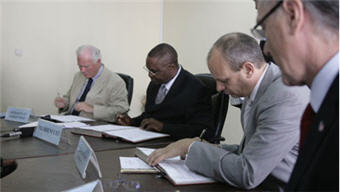On 27 August 2008, the French government and the Independent Electoral Commission (IEC) signed an agreement for one million euros for the urban, municipal and local elections, planned for 2009. This contribution is on top of those received from the UNDP, Switzerland, the United Kingdom, Italy and the European Commission. 
This contribution is implemented through the UN Development Programme’s - Support Project to the Electoral Cycle (PACE) - developed with the IEC, which ensures a direct support to technical and financial management operations of the IEC.
At the signing ceremony, Philippe Righini, representative of the French embassy in the DRC, reiterated the engagement of the French Republic to the democratic process in the DRC.
“This enables France, in conjunction with other financial donors and in particular the Member States of the European Union, to demonstrate our commitment to the reinforcement of the rule of law and democracy in the DRC,” he said.
France had already contributed seven million euros to the electoral process.
“This support falls under the continuity of our support to the electoral process which began in 2005 with the constitutional referendum and continued in 2006 with the presidential, legislative, and provincial elections,” he added.
Ross Mountain, resident representative of the UNDP in the DRC and Deputy Special Representative of the UN Secretary General, stressed that this new contribution confirms the support of the French government for the process of democratization in the DRC since December 2002, with the signature of the overall and inclusive agreement in South Africa.
“This process will not be complete without the last stage which consists in setting up democratically elected institutions at the local level. Without the local elections and the rooting of the process in the villages and territories, one cannot fully establish a democratic system in this country,” he said.
Mr. Mountain also urged the management of these financial contributions with “the same rigour and the same transparency as before.”
The IEC, represented by its second vice-president Nobert Basengezi Katintima, thanked France for its support to the electoral process in the DRC, but also expressed his concern in relation to the challenges ahead.
According to him, the first challenge is how to meet the needs for this vast country on the logistics level.
For example, whereas the number of constituencies is multiplied by 30, that is to say 6,037, compared with 189 at the time of the second round of the presidential elections of 2006, the number of MONUC helicopters set aside for the local elections has decreased.
The second challenge, he added, relates to the laws on decentralisation and in particular the difficulty in applying this law on the ground, because of the vastness of the country and the need to create the terminals, and the limits when you take into account the various ethnic groups.
The 2nd vice-president of the IEC also expressed his concern for the financing of the next stage of the elections.
“We need more than 240 million dollars to finance the local elections, and we do not have a quarter of this figure. Admittedly, MONUC has approved 80 million dollars but there is a condition on this contribution until the decentralisation laws have been fully adopted,” he concluded.
Canada, Belgium and Sweden also promised to contribute to the financing of these future elections.
Related articles
- • European Union Sanctions Rwanda and M23 Officials over Congo Conflict (March 17, 2025)
- • Canada and Germany Impose Sanctions on Rwanda for Supporting M23 Rebels (March 4, 2025)
- • European Union Suspends Defence Consultations with Rwanda (February 24, 2025)
- • Denis Mukwege Wins Sakharov Prize 2014 (October 21, 2014)
- • New DR Congo amnesty law welcomed by UN envoys (February 5, 2014)
- • Congo Army Takes Control of Mbuzi Hill From M23 Rebels (November 4, 2013)
- • UN Security Council debate focuses on peace efforts for Africa's Great Lakes region (July 25, 2013)
- • Thousands of Women March Against M23 Rebels in Kinshasa (November 24, 2012)
- • At high-level meeting, Ban urges political solution to crisis in eastern DR Congo (September 27, 2012)
- • Tshisekedi Says He Won, Can He Prove It? (December 17, 2011)
- • 32 Million Congolese Voters Set to Elect Their Leaders (November 27, 2011)
- • European Union to observe presidential and legislative elections (October 19, 2011)
- • 19,497 Candidates to Run for 500 Seats in Parliament (September 26, 2011)
- • 31 Million Registered to Vote (July 20, 2011)
- • Security Council extends mandate of UN mission in DR Congo (June 28, 2011)
- • EU, DR Congo Sign Elections Funding Agreement (June 25, 2011)
- • Rights Groups: Strengthen Civilian Protection Before Elections (June 9, 2011)
- • Parliament Approves Constitutional Amendments (January 16, 2011)
- • UN Sanctions FDLR Leaders, CNDP Rebel Commander Integrated into Army (December 2, 2010)
- • UN launches patrols to head off rebel violence during holiday season (December 1, 2010)
- • 2010 Human Development Report analyses long-term development trends (November 4, 2010)
- • Congo Defense Minister Rejects UN Allegations against Army (October 17, 2010)
- • Rebel leader presumed responsible for mass rape arrested (October 5, 2010)
- • UN DR Congo Report Exposes Grave Crimes (October 1, 2010)
- • Parliament to Tackle Elections, 2011 Budget during September Session (September 14, 2010)
- • UN says peacekeepers 'failed' DR Congo rape victims (September 7, 2010)
- • UN Defends Inaction on Mass Rapes in Eastern Congo, Government Missing in Action (August 26, 2010)
- • Two Suspects Arrested in Attack on MONUSCO Base (August 20, 2010)
- • Ban Ki-moon deplores deadly attack against blue helmets in North Kivu (August 18, 2010)
- • IEC: Elections to Cost $712 million (August 14, 2010)







